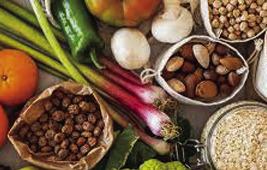Fiber Up
Constipation is one of those subjects we usually only discuss with close friends. But if you suffer from it, you’re not alone. Some 63 million Americans experience the inability to empty their bowels regularly. Having three or fewer bowel movements a week is an indicator of constipation. Left unresolved, it can lead to discomfort and pain, as well as the development of hemorrhoids.
While there may be many causes of constipation (like stress and medications), diet can play a huge role. Higherfiber foods help a lot. Here are several higher-fiber foods to try.
No. 1: Whole-wheat or rye bread. A study in the Journal of Nutrition found that people experiencing constipation who consumed rye bread daily had improvements in bowel movement frequency compared with those who ate white bread. Simply put, added fiber helps form your stools, adding weight to help move stools through your system.
No. 2: Dried plums (prunes). A study in the Journal of Clinical Nutrition discovered that healthy adults with reported infrequent stool habits and low amounts of dietary fiber experienced increased stool weight and frequency by consuming about eight dried plums daily.
No. 3: Sauerkraut and yogurt. Having more good bacteria in our digestive systems through fermented foods and yogurt can help promote regular bowel movements. A study in the European Journal of Clinical Nutrition found that consuming rye bread with yogurt helped relieve gastrointestinal complaints.
No. 4: Chia and flaxseeds. These tiny seeds are good sources of soluble fiber. Soluble fiber increases stool water content resulting in bulky, soft and easy-to-pass stools. You can sprinkle flax or chia on cereal or oatmeal, add to yogurt or a smoothie or top a muffin with them.
No. 5: Water. When we are dehydrated, our large intestine cannot provide enough water to properly form stools, which leads to hard stools and constipation. It’s important to drink plenty of water when adding fiber to our diets. Foods like watermelon and cantaloupe, soup and vegetables also help with hydration.
The bottom line is constipation isn’t something you have to live with. Add fruits, vegetables, seeds, whole grains, fermented foods, yogurt and water to make a difference.
Q and A Q: Why is the mineral phosphorus needed and what foods is it found in?
A: Phosphorus is an essential mineral with an impressive range of functions, so eating a range of phosphorus- rich foods is incredibly important for overall health. It plays an important role in the formation of strong bones and teeth. It also is a key element of cell membranes and helps to activate enzymes, keeping blood pH within a normal range. We need healthy blood pH levels to maintain our respiratory and circulatory systems. Phosphorus-rich foods include dairy (cottage cheese, milk, yogurt), poultry, eggs, legumes (chickpeas, lentils), nuts, seeds (sunflower seeds) and red meat (pork, beef). The recommended daily intake for adults is 700 milligrams.
RECIPE I am often asked if it’s possible to lose weight and eat well at the same time. My answer: Of course it is! It may take a few alterations and a willingness to try some new things, but it’s certainly doable. Here’s a recipe for blueberry muffins from “The Mayo Clinic Diet” that allows you to have a guiltfree muffin. Pair it with some scrambled eggs or a carton of yogurt in the morning or with a salad at lunch.
BLUEBERRY MUFFINS Servings: 12 3/4 cup all-purpose flour 1/2 cup whole-wheat flour 1/4 cup ground flaxseed 1/2 tablespoon baking powder 1/4 teaspoon baking soda 1 teaspoon salt 3 tablespoons unsalted butter 1/2 cup sugar 1 teaspoon pure vanilla extract 1 egg 1/2 cup plain fat-free yogurt 1 cup fresh blueberries Heat the oven to 350 degrees F. Lightly coat muffin tin with cooking spray (or use liners). Combine the flours, seeds, baking powder, baking soda and salt in a bowl; set aside. Using a mixer, combine unsalted butter and sugar until creamy. Add the vanilla and egg. Add the dry mixture alternately with the yogurt. Mix until combined. Fold in blueberries. Fill each muffin cup with 1/4 cup of batter. Bake for 15 minutes. Makes 12 muffins.
Per muffin: 134 calories; 3 grams protein; 21 grams carbohydrate; 4.5 grams fat; 23 milligrams cholesterol; 1.5 grams fiber; 231 milligrams sodium.
Charlyn Fargo is a registered dietitian with SIU Med School in Springfield, Illinois. For comments or questions, contact her at charfarg@aol. com or follow her on Twitter @ NutritionRD. To find out more about Charlyn Fargo and read features by other Creators writers and cartoonists, visit the Creators website at www. creators.com.

